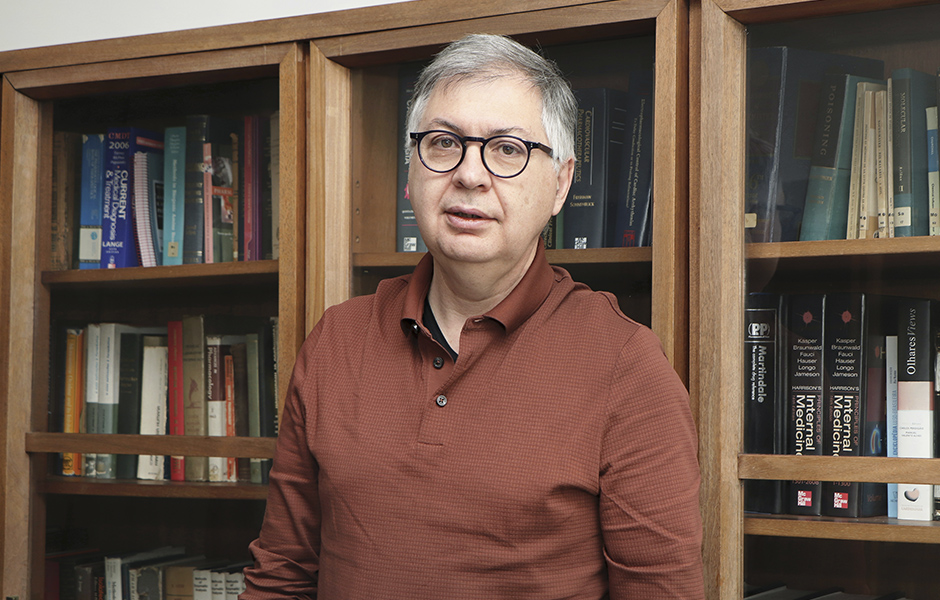Fernando Magro, an integrated researcher at CINTESIS working in the Challenges and Strategy in Health Research – Charter group, was elected president of the European Crohn’s and Colitis Organisation – ECCO in March. It was the first time a Portuguese conquered the leadership of this reference organisation in the area of Inflammatory Bowel Disease (IBD). A victory that represents the recognition of the work he has been developing in recent decades.
Currently, he is also a Guest Associate Professor with aggregation and a member of the Ethics Committee of the Faculty of Medicine of the University of Porto, a researcher at RISE – Associate Laboratory (where he coordinates a Thematic Line), as well as director of Clinical Pharmacology and gastroenterologist at the São João University Hospital Centre (CHUSJ). He is also an honorary member and coordinator of the scientific programme of the Inflammatory Bowel Disease Study Group (GEDII), a member of the International Organisation for the Study of Inflammatory Bowel Disease (IOIBD) and Associate Editor of the United European Gastroenterology Journal (UEG Journal).
He was born 58 years ago in Vinhais, where he studied until the 9th grade. He completed his secondary education in Bragança. He hesitated between chemistry and medical school but chose medicine. He had “the challenge of treating patients and being able to help his neighbour”, he recalls. In 1989, he finished his medical course at the FMUP, where he would later obtain his doctorate. In 1991, he began his career in gastroenterology as an internist at the (then) São João Hospital, where he soon distinguished himself in the area of Crohn’s disease and ulcerative colitis, two immune-mediated diseases with no cure.
“At the time, few doctors were dedicated to the study of these two diseases, which I find fascinating for the mechanisms involved and the challenges they throw up. At the beginning, there were few medications to control them and patients had a very poor quality of life,” he recalls.
Later, “with the appearance of immunomodulators and particularly with biological therapy, the treatment of these diseases evolved immensely. Today we have effective drugs and new concepts in treatment. For example, previously, we only began treating patients when they had symptoms. Now we know that almost 75% of patients without symptoms have subclinical inflammation, that is, there is already inflammation before diagnosis, and there may be persistent subclinical inflammation after diagnosis. Just attending to symptoms is no longer enough,” he notes.
Due to the efficacy of new drugs, the goals of IBD treatment has also changed: “Today, we treat subclinical inflammation and follow different therapeutic targets. We started by targeting clinical response and remission. We have evolved and targeted, namely, healing of all mucosal layers and histological and transmural remission. There is no cure, but there is a more effective treatment that allows us to change the natural history of the disease and improve the quality of life of patients.
As a researcher at CINTESIS/FMUP and as a physician, his main focus has always been the management, treatment and prognosis of IBD, contributing to developments in this area, namely through new endpoints in clinical trials, the harmonisation and standardisation of histological procedures for patient assessment, the discovery of new biomarkers and the dosing of drugs and antibodies as a strategy for therapeutic maximisation.
Another of his contributions was being the founder, in 2005, of the GEDII – Study Group on Inflammatory Bowel Disease. “I soon realised that it was necessary to have people that could gather information from the various centres in the country in a systematic way. One centre alone doesn’t have the capacity to collect enough patients. This national network is essential for research and training”, he underlines.
With this “umbrella”, at CINTESIS, he has developed research into predictive models for diagnosis and treatment, together with researchers from various areas (biologists, biochemists, computer scientists, doctors, mathematicians).
Moving between fundamental science and translational medicine, between Immunology and Gastroenterology, Fernando Magro has explored new concepts and has coordinated or participated in innovative and promising projects, such as the project on the importance of the fecal microbiome in IBD.
To the younger generations, he leaves a message: “Nowadays, you cannot do good fundamental, translational or clinical research without having a persistent focus. There must be funding, but there must also be will from the decision-making structure. It is necessary to stimulate, encourage and reward these paths”.
What is your 1-Year Ambition?
We are currently studying the importance of certain biomarkers and histology in Crohn’s disease.
We also have a major project to evaluate the faecal microbiome (bacteria, viruses and fungi) and its correlation with patient response to therapy for inflammatory bowel disease (IBD).
What is your 10-Year Ambition?
This microbiome project will be an at-least ten-year-long investigation and may change the understanding of inflammatory bowel disease.
We want to know the implications of this microbiome in treatment and what is its predictive factor. We know that certain populations of bacteria, viruses and fungi are altered in IBD and may be responsible for perpetuating inflammation. That is, they may be immunogenic. We want to identify micro-organisms that may be markers of response or non-response to therapy.
How is Life Beyond Teaching and Research?
I don’t have much free time. I like watching films, reading books and spending time with my family. I like poetry a lot.

